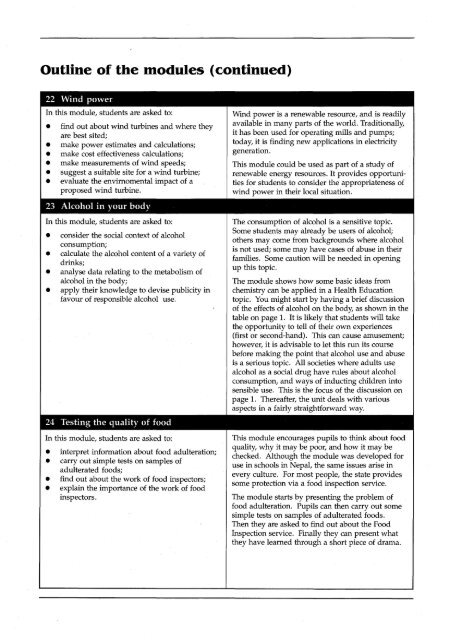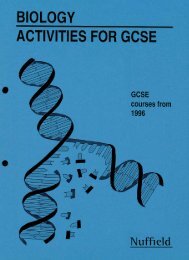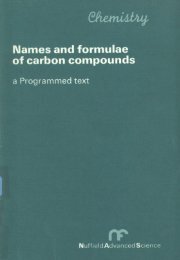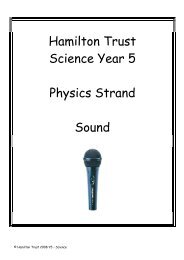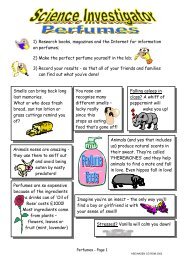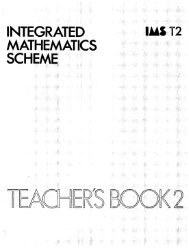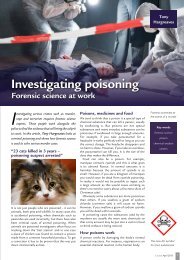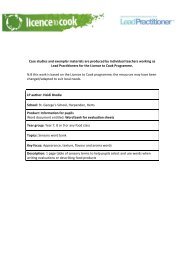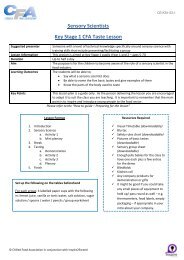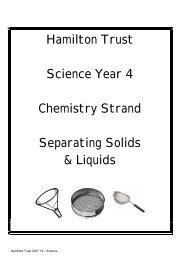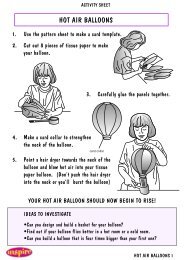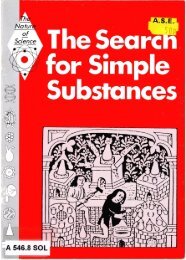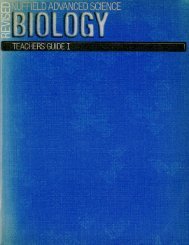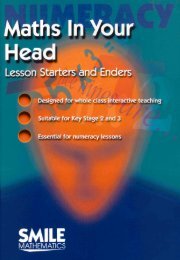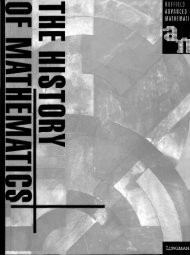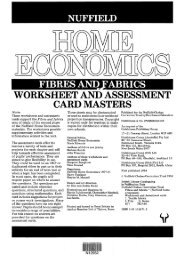UNESCO resource kit - science and technology educa...
UNESCO resource kit - science and technology educa...
UNESCO resource kit - science and technology educa...
You also want an ePaper? Increase the reach of your titles
YUMPU automatically turns print PDFs into web optimized ePapers that Google loves.
Outline of the modules (continued)<br />
22 Wind power<br />
In this module, students are asked to:<br />
• find out about wind turbines <strong>and</strong> where they<br />
are best sited;<br />
• make power estimates <strong>and</strong> calculations;<br />
• make cost effectiveness calculations;<br />
• make measurements of wind speeds;<br />
• suggest a suitable site for a wind turbine;<br />
• evaluate the envirnomental impact of a<br />
proposed wind turbine.<br />
23 Alcohol in your body<br />
In this module, students are asked to:<br />
• consider the social context of alcohol<br />
consumption;<br />
• calculate the alcohol content of a variety of<br />
drinks;<br />
• analyse data relating to the metabolism of<br />
alcohol in the body;<br />
• apply their knowledge to devise publicity in<br />
favour of responsible alcohol use.<br />
24 Testing the quality of food<br />
In this module, students are asked to:<br />
• interpret information about food adulteration;<br />
• carry out simple tests on samples of<br />
adulterated foods;<br />
• find out about the work of food inspectors;<br />
• explain the importance of the work of food<br />
inspectors.<br />
Wind power is a renewable <strong>resource</strong>, <strong>and</strong> is readily<br />
available in many parts of the world. Traditionally,<br />
it has been used for operating mills <strong>and</strong> pumps;<br />
today, it is finding new applications in electricity<br />
generation.<br />
This module could be used as part of a study of<br />
renewable energy <strong>resource</strong>s. It provides opportunities<br />
for students to consider the appropriateness of<br />
wind power in their local situation.<br />
The consumption of alcohol is a sensitive topic.<br />
Some students may already be users of alcohol;<br />
others may come from backgrounds where alcohol<br />
is not used; some may have cases of abuse in their<br />
families. Some caution will be needed in opening<br />
up this topic.<br />
The module shows how some basic ideas from<br />
chemistry can be applied in a Health Education<br />
topic. You might start by having a brief discussion<br />
of the effects of alcohol on the body, as shown in the<br />
table on page 1. It is likely that students will take<br />
the.opportunity to tell of their own experiences<br />
(first or second-h<strong>and</strong>). This can cause amusement;<br />
however, it is advisable to let this run its course<br />
before making the point that alcohol use <strong>and</strong> abuse<br />
is a serious topic. All societies where adults use<br />
alcohol as a social drug have rules about alcohol<br />
consumption, <strong>and</strong> ways of inducting children into<br />
sensible use. This is the focus of the discussion on<br />
page 1. Thereafter, the unit deals with various<br />
aspects in a fairly straightforward way.<br />
This module encourages pupils to think about food<br />
quality, why it may be poor, <strong>and</strong> how it may be<br />
checked. Although the module was developed for<br />
use in schools in Nepal, the same issues arise in<br />
every culture. For most people, the state provides<br />
some protection via a food inspection service.<br />
The module starts by presenting the problem of<br />
food adulteration. Pupils can then carry out some<br />
simple tests on samples of adulterated foods.<br />
Then they are asked to find out about the Food<br />
Inspection service. Finally they can present what<br />
they have learned through a short piece of drama.


